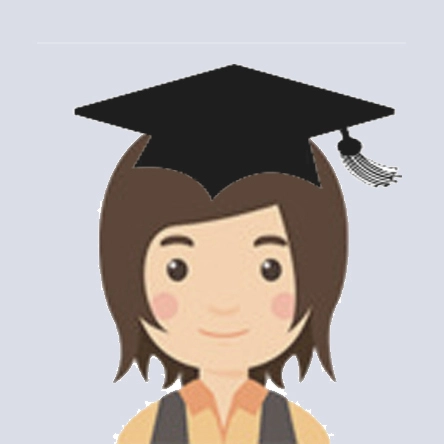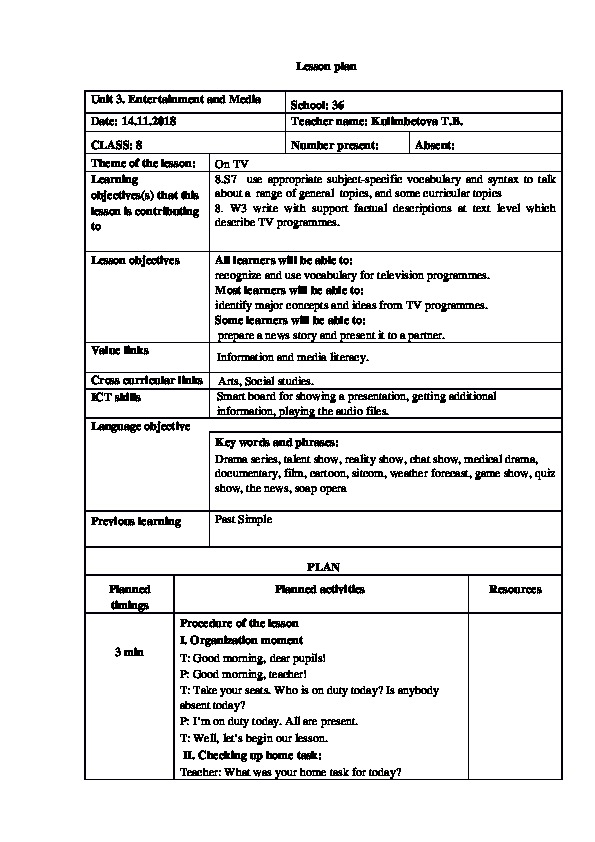8.S7 use appropriate subject-specific vocabulary and syntax to talk about a range of general topics, and some curricular topics
8. W3 write with support factual descriptions at text level which describe TV programmes.
All learners will be able to:
recognize and use vocabulary for television programmes.
Tv programme.docx
Lesson plan
School: 36
Teacher name: Kulimbetova T.B.
Number present:
Absent:
Unit 3. Entertainment and Media
Date: 14.11.2018
CLASS: 8
Theme of the lesson: On TV
Learning
objectives(s) that this
lesson is contributing
to
8.S7 use appropriate subjectspecific vocabulary and syntax to talk
about a range of general topics, and some curricular topics
8. W3 write with support factual descriptions at text level which
describe TV programmes.
Lesson objectives
Value links
Cross curricular links
ICT skills
Language objective
All learners will be able to:
recognize and use vocabulary for television programmes.
Most learners will be able to:
identify major concepts and ideas from TV programmes.
Some learners will be able to:
prepare a news story and present it to a partner.
Information and media literacy.
Arts, Social studies.
Smart board for showing a presentation, getting additional
information, playing the audio files.
Key words and phrases:
Drama series, talent show, reality show, chat show, medical drama,
documentary, film, cartoon, sitcom, weather forecast, game show, quiz
show, the news, soap opera
Previous learning
Past Simple
Planned
timings
3 min
PLAN
Planned activities
Resources
Procedure of the lesson
I. Organization moment
T: Good morning, dear pupils!
P: Good morning, teacher!
T: Take your seats. Who is on duty today? Is anybody
absent today?
P: I’m on duty today. All are present.
T: Well, let’s begin our lesson.
II. Checking up home task:
Teacher: What was your home task for today? Beginning
7 min
5 min
Pupil: Our home task was to write 3 sentences using Past
Simple
III. Warm up:
Teacher shows a video on PPT and asks learners:
What have you seen on the video?
5 W questions approach
What TV programmes do you know?
Which TV programmes do you like best?
When did you last watch it?
Which programme do not you like at all?
What types of programme are most popular in our
country?
Descriptor: a learner
Watches the video
Answers the questions
IV. Dividing into groups: Teacher divides into 2groups
using «Winner show», «Talent show»
V. To match new words with its definition
News – information about what is happening in the world
Soap opera – story of the daily life of a family
Cartoon – it is a illustrated, animated visual art. Specially
for children.
Talent show – a competition between talents
Reality show – a television programme which use ordinary
people instead of actors
Chat show a television or radio show in which
people talk in a friendly, informal way about
different topics
Game show a television programmes on which people
play games
Weather forecast is a statement saying what the weather
will be like the next day or for the next few days
quiz show a radio or television program in which a group
of people compete in answering questions
A documentary a television or radio programme, or a
film, which shows real events or provides information
about a particular subject
Sitcom – it is a type of comedy show
Assessment:
Teacher assesses learners by oral comments:
Well done, good, not bad
VI. Differentiation tasks
PPT
https://www.you
tube.com/watch?
v=VB63VnavjL
g
Worksheet 1
Workbook
Ex 4 Middle
10 min
Tasks for less able learners: to answer
What are your favourite television programmes?
What type of programme is each one?
Tasks for more able students: Read the TV guide and label
the programmes
Descriptor: a learner
Finds new words
Answers the guestion and label the programmes
Assessment:
Teacher assess the learner through «Thumb»
Workbook
Ex 2
Worksheet 3
10min
VII. (G) Jigsaw reading approach
Learners read the text in groups and make up a poster
about advantages and disadvantages of TV
1st group:
Television is one of the most important invention in
transforming the information of the history , It can be
a great source of entertainment , knowledge and for
communication , you can get a whole look all over the
world , and many people love television so much that
they make their careers out of it .
Television helps to upgrade the knowledge , it helps
you to know the latest trend going on in the world , It is
nowadays one of the widely used communication
media , We can learn several languages and lots of
other useful things by watching television , some shows
and channels offer the educational programs that can
increase our knowledge and make us more aware of
the world around us , It can connect us to the world
and beyond .
2nd group:
The children sometimes watch the scary movies which
affects their mental condition , they sit very close to the
TV which is not good for the eyesight of the
children , The students do not pay attention to their
studies while watching TV which affects the education
of them . There are thousand of shows or movies
shown on TV , Hence some people waste more time
everyday while watching TV, if people spend much
more time on watching TV then they may become
lazy
from work
by watching TV. The advertisers often target the kids ,
the children see about 40,000 ads per year on television
Sometime distraction
,
Poster
Worksheet 4 End
5 min
alone, including ads for the unhealthy snack foods and
the alcohol
Groupassessment sheet
Descriptors Yes
1.read the text
2.present the poster
Descriptor: a learner
Reads the text
Works in groups
Make up a poster
No
Conclusion. Ex 5 Choose the correct answers
1. Who was wearing a green hat?
2. People ___ when it started snowing
3. Were the police doing anything
4. The robber was ___ when Mrs Banks stopped him?
5. What was the man doing in the park?
Hometask: to write essay about «My favourite TV
programme»
Selfreflection.
Plus
Minus
Interesting
If children liked something at the lesson they put it into
the column “plus”, if they didn’t like or were bored during
some part of the lesson, they can use the column “minus”,
the section “interesting” is for those activities which were
interesting during the lesson.
Descriptor:
A learner:
brainstorms ideas while speaking in a group.
uses the topical vocabulary while matching words.
chooses the right answers.
Worksheet 5 Additional information
Differentiation –
how do you plan to give more
support? How do you plan to
challenge the more able
Differentiation can be achieved
through the selection of
activities,
identification of
learning outcomes for a certain
student, provision of individual
support to learners, selection of
learning materials
and
resources based on
the
individual abilities of learners.
Critical thinking
think critically,
Students
exploring,
developing,
evaluating and making
choices about their own and
others’ ideas
Assessment –
how are you planning to
check learners’ learning?
Assessment criteria:
Assessment criteria:
1.Discuss a problem in groups
and suggest a solution to a
problem.
related
2.Apply
speech
vocabulary
appropriately arranging words
and phrases into wellformed
sentences.
3.Identify facts and details in
extended talks with little
support.
Descriptor:
A learner:
topic
in
brainstorms ideas while
speaking in a group.
uses the topical vocabulary
while matching words.
chooses the right answers.
Observation
Feedback on the work
Selfassessment
Материалы на данной страницы взяты из открытых истончиков либо размещены пользователем в соответствии с договором-офертой сайта. Вы можете сообщить о нарушении.
03.02.2019
Посмотрите также:
© ООО «Знанио»
С вами с 2009 года.
![]()
О портале


